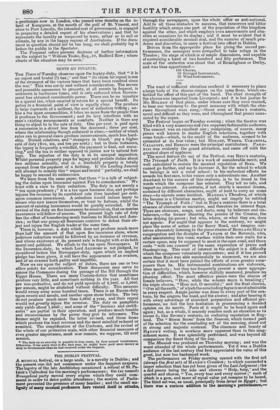HINTS ON FINANCE.
THE Times of Tuesday observes upon the legacy-duty, that " it is an unjust and brutal (!) tax ;" and that " its claim for repeal is one of the strongest of the various taxes that have been remitted since the war." This was surely said without consideration. The secure and peaceable succession to property, at all events by bequest, is unknown in barbarous times, and is only enforced when Govern- ment has obtained considerable power. There can be no injustice in a special tax, when enacted in return for a special benefit. Its policy in a financial point of view is equally clear. The produce is lam (upwards of a million), the cost of collection trifling ; un- like a6tax upon commodities, it takes no more from the people than it produces to the Government ; and its levy interferes with no man's existing arrangements or comforts. Neither is there any thing to object to in the rate of duty. One per cent, is paid upon a succession in a direct line from the deceased ; three per cent. where the relationship though collateral is close,—neither of which rates can in general cases produce inconvenience, much less hard- ship. Distant relations, and" strangers in blood," pay a higher rate of duty (five, six, and ten per cent.) ; but in these instances, the legacy is frequently a windfall, the payment is final, not recur- ring,* and the tax is neither opposed to justice nor to natural feel- ings. The injustice of the duty is in its unequal imposition. Whilst personal property pays for legacy and probate duties about two millions annually, real (i. e. freehold) property is totally exempt from the payment of a farthing. If the Leading Journal will attempt to remedy this" unjust and brutal" partiality, we shall be happy to second its endeavours. We learn from the same paper, that there " is a talk of subject- ing the duties upon Insurance against Fire to consideration." We trust with a view to their reduction. The duty is not merely a "tax upon prudence ;" it is a tax upon business also, and perhaps injures the revenue by its exorbitant rate (two hundred per cent. upon common insurances). A reduction would induce" many to insure who now insure themselves, or trust to fortune, whilst the, amount of existing insurances would be greatly extended. If the revisal of the duty on fire insurances be resolved on, that on marine insurances will follow of course. The present high rate of duty has the effect of transferring much business to Holland and Ame- rica ; so that our grasp-all financiers contrive to defeat their ob- ject and injure the English trader at the same time. There is, however, a duty which does not produce much-more than half the amount of that upon fire insurance alone, whose judicious reduction would be followed by an increase of revenue, and whose existence at its present rate is fraught with evils both moral and political. We allude to the tax upon Newspapers. If the Insurance-duty, to which Lord ALTHORP is not pledged, be considered before the Newspaper-duty, upon which an implied pledge has been given, it will have the appearance of an evasion, and of an evasion both paltry and impolitic. Now we are upon the subject of duties, there are one or two other points for consideration. Their discussion may serve to amuse the Commons during the passage of the Bill through the Upper House. There are many Custom-duties that sometimes produce very little, and sometimes nothing in the year. All that are non-protective, and do not yield upwards of 2,000/. or 3,000/. per annum, might be abolished without difficulty. This measure would sweep away some hundred taxes.. There is an Excise-duty upon sweets and meads, and another upon stone bottles. The two do not produce much more than 5,000/. a year, and their repeal would not greatly injure the revenue. The duty on pamphlets only yields about 1,0001.; and some of the "licences and certifi- cates" are partial in their operation, and produce much trouble and inconvenience by the power they give to informers. The former might be repealed, the latter revised, and those items which produce the least revenue and the most mischief reduced or remitted. The simplification of the Customs, and the revisal of the whole of our protective scale, with other financial measures of even greater importance, must now remain, we suppose, till next session.
The duty on an annuity is payable in four years, by four annual instalments. Otherwise, if the party died in the first year, he might have paid more money as duty to Government than he had received under the bequest.


























 Previous page
Previous page